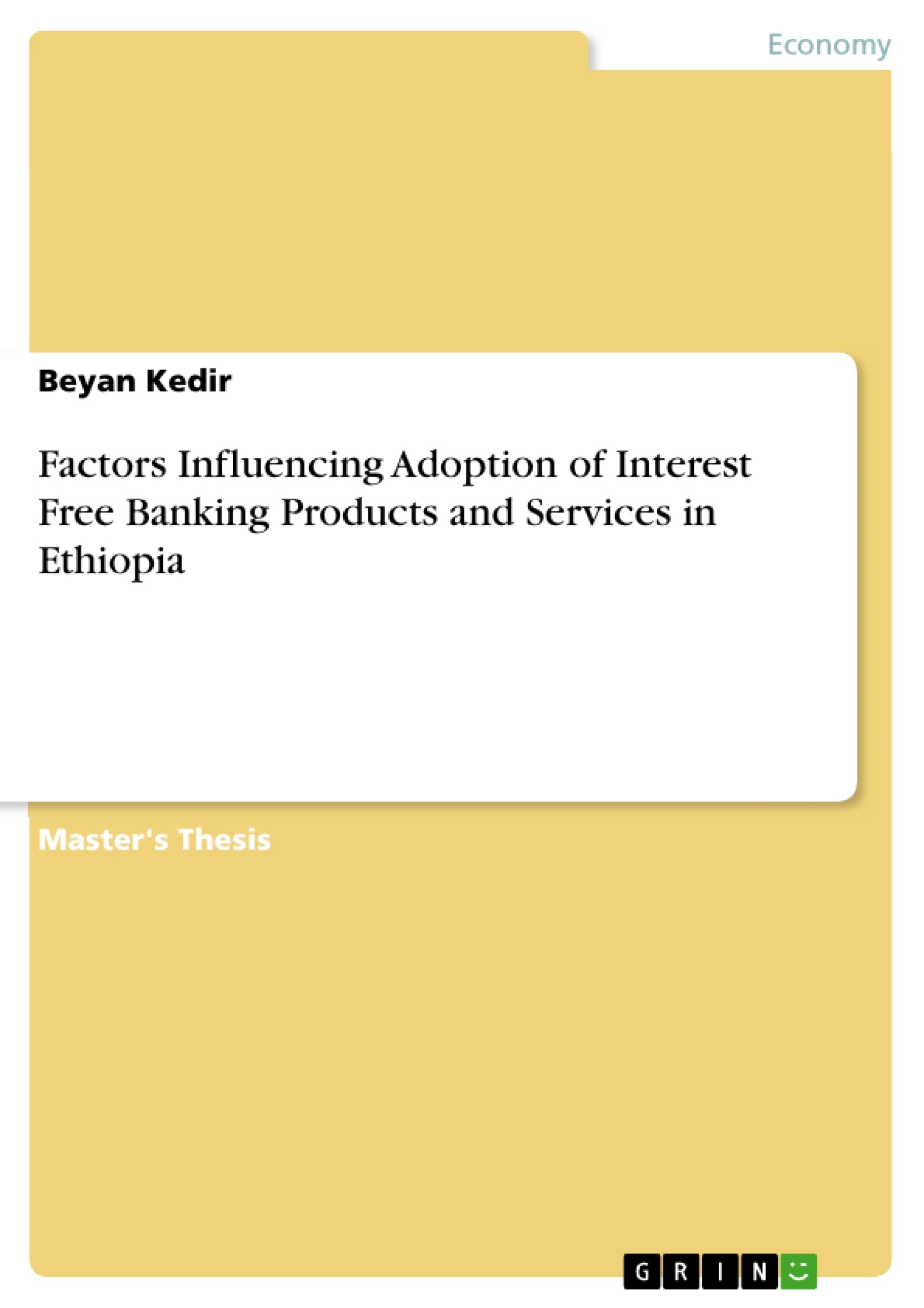The main objective of this study is to identify the major factors influencing the adoption of Interest free banking products and services among customers in Bale Robe town. The research employs decomposed theory of planned behavior to investigate the influence of customer’s behavior towards adoption of interest-free banking product and services by using customers attitude attribute social influence and perceived behavioral control. Both qualitative and quantitative research approach were applied in the study. The target populations were 13050 customers of four banks in Robe town and the total sample size were 388. A purposive sampling technique was applied. Primary and secondary data were used with five point liker scales to collect data from respondents. Both descriptive and inferential statistics analysis were employed to analyze the data.
Interest free banking is inseparable of Islamic economics which aimed at realization of a greater justice in human endeavor, which is achievable only with participation of all human institution inclusive of financial system. On the principle that prohibits interest and other unethical and non shariah compliant activities, Islamic banking set to achieve this gigantic objective. In addition, it strive on increasing all Halal aspect of business through provision of products and services base on shariah principle with implementation of legitimate profit and loss sharing, paying Zakah, prohibition of interest, monopoly and other forms of unethical trade and transaction such as dealing with pork, alcohol and gambling. Hence, Islamic banking method of financing and or products structure is based on the tract to redress the inherent injustice tied with interest based dealing.
Inhaltsverzeichnis (Table of Contents)
- APPROVAL SHEET
- ACKNOWLEGDEMENT
- Lists of Table
- Lists of Figures
- ACRONYMS
- ABSTRACT
- CHAPTER ONE
- INTRODUCTION
- Background of the study
- Statement of the Problem
- Objective of the Study
- General Objective of the Study
- Specific Objective of the Study
- Basic Research Questions
- Scope of the Study
- Significance of the Study
- Limitations of the Study
- Delimitations of the Study
- CHAPTER TWO
- LITERATURE REVIEW
- Chapter Overview
- Development of Interest Free Banking
- Major Products of IFB
- Theoretical Review
- Theory of Planned Behavior (TPB)
- Decomposed Theory of Planned Behavior (DTPB)
- Empirical Review
- Conceptual Framework
- CHAPTER RHREE
- RESEARCH METHOD AND MATERIAL
- Introduction to Research Methodology
- Research Design
- Study Area
- Target Population
- Sampling Frame
- Sampling Techniques
- Sampling Size
- Source of Data
- Data Collection Method
- Data Collection Instrument
- Data Presentation and Analysis
- Ethical Consideration
- CHAPTER FOUR
- Results and Discussion
- Demographic characteristics
- Descriptive Summary of Each variable characters
- Regression Analysis
- Common Assumption Test
- Multicollinearity Test
- Linearity Test
- Normality test
- Autocorrelation/Durbin Watson Test
- Linear regression interpretation
- Beta Coefficients and variables result definition
- CHAPTER FIVE
- Conclusion& Recommendation
- Summary of Findings
- Conclusion
- Contribution of the study
- Limitation and Future Area of the Study
- Recommendation of the Study
Zielsetzung und Themenschwerpunkte (Objectives and Key Themes)
This thesis examines the factors influencing the adoption of interest-free banking products and services in Bale Robe Town, Ethiopia. The study aims to identify key determinants of adoption, explore the potential benefits and challenges of interest-free banking, and contribute to the understanding of financial inclusion in the context of Islamic finance. * **Key Themes:** * **Adoption of interest-free banking products:** The study focuses on understanding the factors influencing the adoption of these products by individuals and businesses in Bale Robe Town. * **Financial inclusion:** The research explores the role of interest-free banking in promoting financial inclusion and access to financial services in the Ethiopian context. * **Islamic finance principles:** The study examines the application of Islamic financial principles to the Ethiopian banking sector and its implications for financial inclusion. * **Theory of Planned Behavior (TPB):** This theory provides a framework for understanding individual behavior and is used to analyze the factors influencing the adoption of interest-free banking products. * **Empirical analysis:** The thesis utilizes a quantitative research approach and statistical analysis to explore the relationship between various factors and the adoption of interest-free banking products.Zusammenfassung der Kapitel (Chapter Summaries)
- **Chapter One: Introduction:** This chapter sets the context for the study, introducing the background of interest-free banking and outlining the research problem, objectives, and significance.
- **Chapter Two: Literature Review:** This chapter presents a comprehensive review of existing literature on the development of interest-free banking, the major products offered by IFB institutions, and relevant theoretical frameworks, including the Theory of Planned Behavior (TPB).
- **Chapter Three: Research Method and Materials:** This chapter details the research methodology employed in the study, including the research design, study area, target population, sampling techniques, data collection methods, and data analysis plan.
- **Chapter Four: Results and Discussion:** This chapter presents the findings of the study, including demographic characteristics of the respondents, descriptive analysis of key variables, and regression analysis to identify the factors influencing the adoption of interest-free banking products.
Schlüsselwörter (Keywords)
The main keywords and focus topics of this thesis include interest-free banking, financial inclusion, Islamic finance, Theory of Planned Behavior, adoption, Bale Robe Town, Ethiopia, empirical analysis, quantitative research, and development economics.- Citation du texte
- Beyan Kedir (Auteur), 2020, Factors Influencing Adoption of Interest Free Banking Products and Services in Ethiopia, Munich, GRIN Verlag, https://www.grin.com/document/1005608




